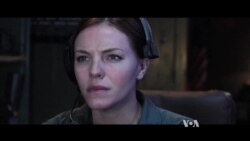In his drama Drones, filmmaker Rick Rosenthal poses complex security, political and ethical questions about drone attacks in the ongoing war against global terrorism.
Rosenthal builds a tense character drama inside a windowless control room at a Nevada airbase, where two pilots have a close up look at the innocent people they will have to kill in order to eliminate the terrorist amongst them.
One pilot faces court-martial for refusing to obey her orders. Her father, an Air Force general, makes a last attempt to convince her to complete the mission.
“Susan, if we had drones back then I wouldn’t have [had] to drop bombs on God knows how many thousands of non-combatants,” he tells her.
Rosenthal says his film does not make a judgement about drone technology.
“It might be anti-war, but I don’t think it’s a film that takes a side are drones good or are drones bad,” Rosenthal said.
But it does question absolute authority.
“Is it more patriotic to question when you feel something is being done wrong?" he said. "That’s a complex issue as well.”
The film questions whether it's possible to wage an objectively defensive and ethically acceptable remote-controlled war.
“Where you stand depends on where you sit," Rosenthal said. "So, if you are in the Middle East and your family has been attacked by drones, you are going to have a very strong attitude about the efficacy of drones. If you are somebody whose family has been killed by a terrorist attack, you are also going to have a very strong feeling about the use of drones.“
Although his film is fiction, Rosenthal says the story is based on real drone pilot accounts and intelligence on this new type of warfare.
And while piloting a drone may feel like playing a video game, the targets are for real.
Rosenthal builds a tense character drama inside a windowless control room at a Nevada airbase, where two pilots have a close up look at the innocent people they will have to kill in order to eliminate the terrorist amongst them.
One pilot faces court-martial for refusing to obey her orders. Her father, an Air Force general, makes a last attempt to convince her to complete the mission.
“Susan, if we had drones back then I wouldn’t have [had] to drop bombs on God knows how many thousands of non-combatants,” he tells her.
Rosenthal says his film does not make a judgement about drone technology.
“It might be anti-war, but I don’t think it’s a film that takes a side are drones good or are drones bad,” Rosenthal said.
But it does question absolute authority.
“Is it more patriotic to question when you feel something is being done wrong?" he said. "That’s a complex issue as well.”
The film questions whether it's possible to wage an objectively defensive and ethically acceptable remote-controlled war.
“Where you stand depends on where you sit," Rosenthal said. "So, if you are in the Middle East and your family has been attacked by drones, you are going to have a very strong attitude about the efficacy of drones. If you are somebody whose family has been killed by a terrorist attack, you are also going to have a very strong feeling about the use of drones.“
Although his film is fiction, Rosenthal says the story is based on real drone pilot accounts and intelligence on this new type of warfare.
And while piloting a drone may feel like playing a video game, the targets are for real.





